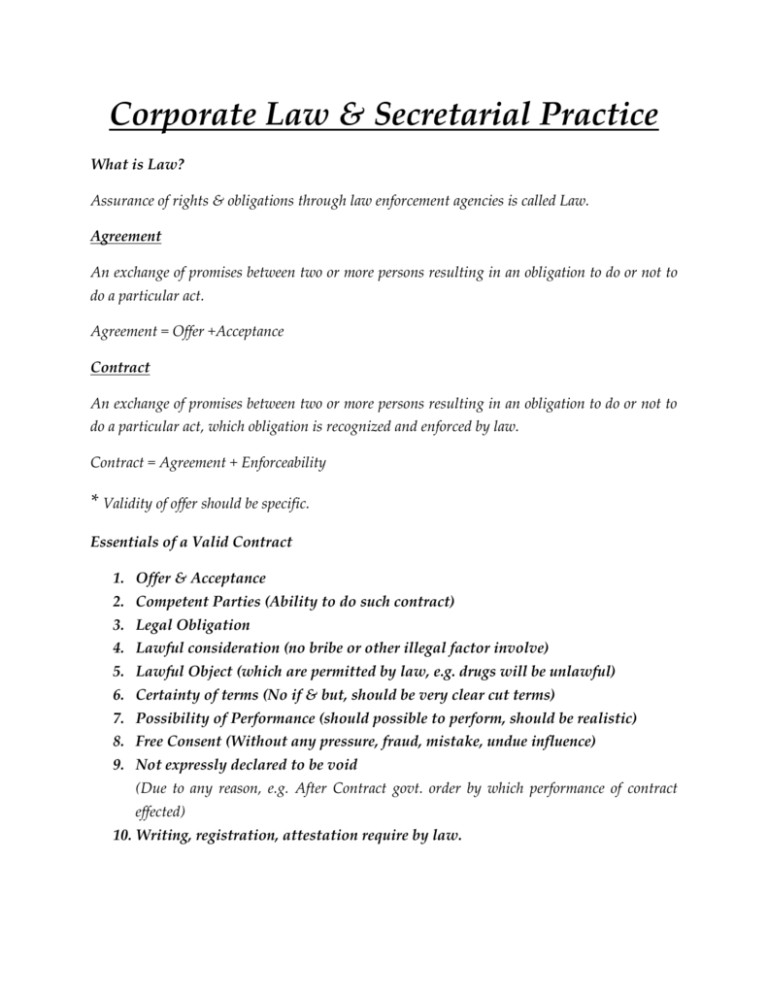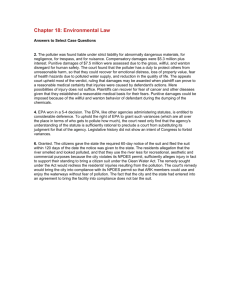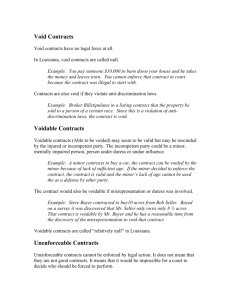File
advertisement

Corporate Law & Secretarial Practice What is Law? Assurance of rights & obligations through law enforcement agencies is called Law. Agreement An exchange of promises between two or more persons resulting in an obligation to do or not to do a particular act. Agreement = Offer +Acceptance Contract An exchange of promises between two or more persons resulting in an obligation to do or not to do a particular act, which obligation is recognized and enforced by law. Contract = Agreement + Enforceability * Validity of offer should be specific. Essentials of a Valid Contract 1. Offer & Acceptance 2. Competent Parties (Ability to do such contract) 3. Legal Obligation 4. Lawful consideration (no bribe or other illegal factor involve) 5. Lawful Object (which are permitted by law, e.g. drugs will be unlawful) 6. Certainty of terms (No if & but, should be very clear cut terms) 7. Possibility of Performance (should possible to perform, should be realistic) 8. Free Consent (Without any pressure, fraud, mistake, undue influence) 9. Not expressly declared to be void (Due to any reason, e.g. After Contract govt. order by which performance of contract effected) 10. Writing, registration, attestation require by law. Classification of Contract According to Validity or Enforceability According to Formation or Creation Valid Contract Express Voidable Contract Implied Void Contract Quasi According to Performance Executed Executory Types of Contract (By Enforceability) Valid Contract Voidable Contract Void Contract Valid Contract Valid contract is one which is fully operative in accordance with the intention of the parties and the law. Valid contract is one which enforceable by law. Valid contract must have all the essentials elements prescribe by law; if one of such elements is missing then contract will be voidable or unenforceable. Voidable Contract Voidable contract can be enforceable by law but due to lacking of any contract essential, innocent party can aberrant so this contract is called Voidable Contract. Circumstances which make contract voidable Absence of free consent When in a contract the essential element of free consent is missing i.e. the consent is caused by coercion, undue influence, fraud or misrepresentation. Prevention of Performance When one party prevents other party for performing their part of contract Failure to perform in Time When the time is essential in contract and any party fail to perform his part of contract in fixed time. Void Contract Void contract is which subsequently ceases to be enforceable by law. A Void contract is that which when originally made is perfect and binding under the law, but due to subsequent change in circumstances it becomes Void. Example: A contact made between two parties in two different countries but war declares between these countries the contract will be void and unable to perform. Types of Contract (By Formation) Express Contract Implied Contract Quasi Contract Express Contract An Express contract is one in which the parties have made oral or written declaration of their intention and terms of transaction. An express contract is one the terms of which are expressly agreed upon by words (spoken or written) at the time of formation of the contract. Implied Contract An implied contract is such a contract in which parties express their consent of formation of contract through their action. Example: A person went to the coffee shop and have a cup of tea, this is a best example of implied contract. Action of that person shows that he/she is ready to form contract. Quasi Contract Quasi Contract may be defined as an obligation created by law (Regardless of agreement) whereby an obligation is imposed on a party due to action taken by that party. Example: A forgot his mobile in B house and B use that mobile or sell that mobile then A is liable to compensate. Types of Contract (By Performance) Executed Contract Executory Contract Executed Contract An executed contract is one which has been completely performed by both the parties, under the terms of the contract nothing remain to be done by either party. Example: Aslam contracts to buy a bicycle from Bilal. Aslam pays cash to Bilal and Bilal delivers the bicycle to Aslam. This is an executed Contract. Executory Contract An executory contract is one which is unperformed, or in which there remains something further to be done or the parties have yet to perform their things. Offer & Acceptance through Courier/Remote Parties If A send offer to B and B accept the offer & send acceptance to A, then A only can withdraw from this offer till A receive acceptance from B. Performance of Contract Single Promise Only promisee is allowed to ask about performance of contract from promiser. Only promiser is liable for performance other then any person even the relatives are not liable for anything. Joint Promise Party 1 A,B,C Promisee (Promise to Pay Back Loan) Party 2 X,Y,Z Promiser In the joint Promise everyone in promiser side is liable for fulfill the performance of contract, if one of promiser pay or fulfill all terms and conditions of contract then every promiser is free from performance of contract. In case of any individual at promiser’s side pay all debts to promisee then the other members of promiser party will be automatically come in Quasi contract & other members of promiser party will be liable to pay to that member who paid to promisee party. Same case in promise side. Discharge of Contract (End of Contract) 1. By Performance 2. By Agreement 3. Subsequent Possibility 4. Lapse of Time 5. Operation of Law 6. Breach of Contract 1. Discharge By Performance Performance is the obvious mode of discharge of a contract, performance means the doing of what is require by the contract. Actual Performance (When parties done what ever require to done according to Contract) Excused Performance (The contract is discharged when the performance is dispensed or excused by any law or the contract e.g. Insolvency of the party) 2. Discharge By Agreement A contract may be discharged by an agreement of all the parties. 3. Discharge by Subsequent Impossibility This is the point when the performance of contract is impossible due to any reason e.g. war declare between two countries where both parties belongs to. 4. Discharge by Lapse of time Under the limitation Act 1908, action against the non performance of a contract must be taken by the promisee with within the period of limitation. In case of delay he is deprived of his remedy at law. Example: A took a loan from bank repayable on an agreed date. If the bank does not file a suit within 3 days from such date, A is discharged of his liability. 5. Discharge by operation of law A contract may be discharged by operation of law in a number of ways. a. Where the parties make a new contract and agree to make void old one. b. Under the insolvency law when a person adjudicated insolvent he is discharged from his liabilities and contracts. c. When a party to a contract makes an unauthorized alteration, without the knowledge and consent of the other party, the contract can be avoided by the other party. 6. Breach of Contract Remedies of Breach of Contract This is the situation where there is a breach of the contract and innocent party becomes entitled to take legal action against the party at breach. Innocent party entitled to one or more of the following remedies. 1. Rescission (Cancel, End) of the contract. 2. Suit for damages. 3. Suit upon quantum merit. 4. Suit for specific performance 5. Suit for injunction. 1. Rescission (Cancel, End) of the contract When a contract is broken by one party, the other party may treat the contract as rescinded and refuse to perform his part of the contract, in such a case innocent party released from their obligations under the contract. 2. Suit for damages Damages meaning the money compensation allowed to an innocent party for the loss or innocent suffered by him by the breach of the contract. There different types of damages mentioned below. Ordinary damages (compensation on actual damage) Special damages (Actual + Special or Loss of Profit or further damage) Exemplary damages (Make example for others) Liquidated damages (Predefined damages written in contract) 3. Suit upon quantum merit Partially performed. 4. Suit for Specific Performance Where damages are not adequate remedy, the court may direct the party in breach to carry out his promise according to the terms of the contract. In simple words court can order the other party to complete the performance of contract as per contract terms and conditions. 5. Suit for injunction Injunction is an order of the court restraining a person from doing a particular act. Indemnity Indemnity is a contract by which one party promises to save the other from expected loss in future. Guarantee A contract of guarantee is a contract to perform the promise, or discharge the liability of a third person in case of principle party or debtors default. 1. Surety (The person who gives the guarantee) 2. Creditor (The person to whom guarantee is given) 3. Principle Debtor In the contract of guarantee creditor will suit against the principle debtor but in case of default of principle debtor creditor will be liable to for contract performance. No one become the guarantor voluntarily. Guarantor has right against the principle debtor after paying or compensating to creditor. Bailment Bailment means to delivering of goods by one party to another party for some purpose upon a contract that when the purpose will accomplish or done shall be returned. Example: You give cloths to tailor for stitching but ownership is not transferred, cloths will be handed back after stitching. (2) A delivers a television for repair to B. It is bailment between A & B. Pledge Pledge is the bailment of goods as security for payment of a debt or performance of a promise. Agency Agent is doing something on the behalf of principle, if agent do any commitment the principle is also liable to oblige that commitment. Partnership (Act 1932) Agreement between two or more persons to earn profit is called partnership. In the language of law partnership business called Firm. Formation of Partnership 1. Form V (Attachment of credentials) 2. Partnership deed 3. Fee paid challan (Form – 32A) 4. CNIC’s of partners & other (others may consist on witness) If no discrepancy found then partnership certificate will be issued. Maximum no of partners can be 20. Why Partnership registration is required? If no partnership then other can sue partnership but partnership can’t sue, then partners have to sue others as individual bases. If partnership is registered then partnership can sue to other on the behalf of partnership rather than to sue individually. Partnership can run without registration but company can’t run business without registration. Dissolution of Firm 1. All partners agreed to dissolve the partnership. 2. Compulsory Dissolution (All partners or except one partner become insolvent, or if firm become unlawful activity) 3. Contingent dissolution (Conditional or expiry of firm, death of partner) 4. Resignation of Partner 5. Dissolution by notice (where any partner gives notice in writing to all other partners of his intention to dissolve the firm) 6. Dissolution by Court (Court dissolve partnership due to change in the opinion of partners regarding dissolution) Priority Steps for liquidation of Assets 1. External Debts payoff (3rd parties debts) 2. Internal debts (payoff to partners debts) 3. Remaining distribute according to profit ratio. 4. Surplus distribute according to profit ratio.




